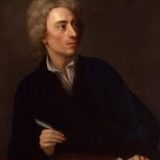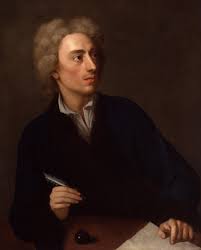Poems, Epistles & Satires – Alexander Pope – 1710~
Reviewed by: Michael Sympson Date: 13 September 2001
A catholic in a country whose laws discriminated against Catholics, (England had just exiled a king because he was Catholic,) crippled by polio, of unsightly appearance – the odds were stacked against Alexander Pope. Yet he accomplished what few, if any, had achieved before him: in a system without copyright (though violations of the “Royal Privilege” could get you in serious trouble,) where publishers unashamedly shortchanged their authors with a mere pittance, and patronage still had to make ends meet even for the best of authors, Alexander Pope became a millionaire. His work generated a considerable income, and shrewd investments in the period’s trade enterprises settled the poet comfortably in sheltered land-ownership.
How did he do this? Well, it may sound corny, but by hard work and thorough professionalism. He never wrote something for nothing and specialized on just one aspect in his talent: Pope decided to write in heroic couplets and nothing but heroic couplets, and this single-minded determination produced an extraordinarily flexible instrument. I have to confess, there was a time when I was simply not mature enough and too much impressed by the romantics’s candy for the ear, to really appreciate Pope. I used to gripe at him as the best writer of English prose. I hope, should he look down from Elysium, he will forgive me.
Pope was the man of discipline – intellectually and formal. An ambassador of humanism and the golden mean. Like so many of his peers Pope was a deist, who didn’t believe in divine interventions but saw the universe more or less as a clockwork, for eternity ruled by Newton’s laws. The only divine touch needed was an initial push, after which creation was left on its own. In fact even the initial fiat was hardly numinous in its nature, rather a continuation of Newton’s laws into the unexplained. Since the signs of design in nature appeared to be self-evident, Pope’s essays and his “Universal prayer” gave expression to the tacit assumption that such perspective would underpin all human culture everywhere, and that superstition and religion are merely locally introduced to patch up our etiological ignorance – and to tame the mob!
This is neither atheism nor biblical faith, but secular humanism in a religious guise. Most signatories of the American Constitution had been deists. Pope’s Essay on Man is the great humanist manifesto of the period, despite its obligatory nods to biblical faith – as the least imperfect of all religious superstitions available. Needless to say that this was in no way backed up by any actual knowledge of the great non-Christian systems of believe, perhaps with the exception of Islam. That Christian ethics could compare rather unfavorably was almost inconceivable; but even in Pope’s generation people would express regret for the biblical images of bloodletting and taboo that have nothing to do with being a good person or advancing society toward greater happiness; the Bible’s utter lack of humor and of a mature acceptance of sexuality became more and more apparent, let alone the inherent wickedness of a doctrine that turns morality to a choice between heaven and hell.
Yet deism itself at its core is not entirely free of metaphysical contradictions, and it is hard to understand how so many bright people of that period wouldn’t notice. Apparently there was a gentlemen’s agreement to leave metaphysics alone: “The proper study of mankind is man!,” says Pope, which I think is still an agreeable proposition. To trounce Pope and his peers for intellectual shallowness overlooks too many things that speak in their favour: for the first time since the ancient Hellenists, an unflinchingly rational perspective faced the issues; modern science began to establish a reputation, and communication and free speech enjoyed an uneasy treaty with absolutist lenience. Literacy was on the advance, but claims of religious infallibility and political absolutism still hovered menacingly in the background. It was still customary to roast witches alive over a slow fire.
 This was an other Augustan age, and like poets under Caesar Augustus, intellectuals needed a protective cant to address issues, without suffering from the wrong kind of attention. Notice how Dryden, in what seems to be the preface to a translation of Virgil’s “Aeneid,” snuck in his own political views and republican proclivities. Pope and his peers clearly felt a kinship with Virgil and Horace. Since Dryden had comprehensively taken care of Virgil, Horace was left to Pope’s exploits. But Pope felt he could do even better and published his rendition of Homer. To be honest, it is more Pope than Homer, and like all great geniuses, Pope was not only generous in giving but also could generously take – in this case from Chapman’s supreme translation – but this goes with the territory. The speculation paid off and made Pope a rich man.
This was an other Augustan age, and like poets under Caesar Augustus, intellectuals needed a protective cant to address issues, without suffering from the wrong kind of attention. Notice how Dryden, in what seems to be the preface to a translation of Virgil’s “Aeneid,” snuck in his own political views and republican proclivities. Pope and his peers clearly felt a kinship with Virgil and Horace. Since Dryden had comprehensively taken care of Virgil, Horace was left to Pope’s exploits. But Pope felt he could do even better and published his rendition of Homer. To be honest, it is more Pope than Homer, and like all great geniuses, Pope was not only generous in giving but also could generously take – in this case from Chapman’s supreme translation – but this goes with the territory. The speculation paid off and made Pope a rich man.
T.S. Eliot’s “Quartets” rediscovered for modern poetry the conversational tone and the philosophical subject. But Eliot’s anti-Semitism and semi-fascist position fails the achievements of Pope’s generation by a long way. Eliot only recaptured a lost skill, a skill that Pope had honed and refined in the period of Augustan poetry in a rare feat of uniting sensual thought and euphonic language with a sharp intellectuality. A performance of transparent lucidity, polish, and enlightened exuberance. It was an urban exercise, meant to address the cream of the metropolitan hub – a polite exercise for polite society; so Pope didn’t feel the need to fall into the parochial trap of neighborhood provincialism and uttering oracles from the kitchen sink, which presently seems to pass for poetry in America. Reading Alexander Pope these days, comes as a breath of fresh air.















